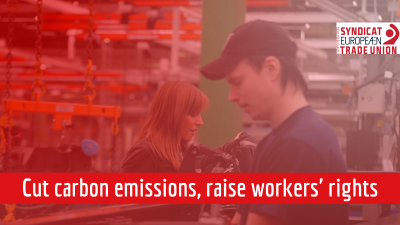Trade unions today challenged the European Commission to match the United States on their commitments to raising social standards as well as subsidy levels through the Net-Zero Industry Act.
ETUC and industriAll Europe leaders met with Commission Vice-President Valdis Dombrovskis to discuss the policies announced last week in response to the United States’ Inflation Reduction Act.
They set out union support for plans to speed up the transition to a green economy and keep high quality jobs in Europe but said the Commission should also take inspiration from the US in combining that with measures to raise wages and working conditions.
The White House says the Inflation Reduction Act will be “the most aggressive action on tackling the climate crisis in American history, which will lift up American workers and create good-paying, union jobs across the country.”
The Inflation Reduction Act includes:
- Bonus tax credits for companies which pay decent wages and hire apprentices;
- Tax corporate stock buybacks to encourage businesses to invest instead of enriching CEOs;
- Extra tax credits for clean energy projects established in communities previously reliant on extractive industries.
The Commission must include similar measures in the Net-Zero Industry Act and European Sovereignty Fund to ensure that public money is used to raise social standards at the same time as supporting European industry and cutting carbon emissions.
Failure to do so would be a contradiction of the measures to support collective bargaining and end union busting included in the EU directive on adequate minimum wages adopted last October.
ETUC and industriAll Europe are calling on the Commission to make support dependent on companies’ commitments to:
- Bargain with trade unions and respect for collective agreements;
- Information and consultation with unions on merger and investment decisions;
- Avoid redundancies and deterioration of working conditions;
- Ban dividend payments while a company is in receipt of any form of public funding;
- Reskilling and the creation of high-quality apprenticeships and graduate roles.
The ETUC and industriAll Europe also held a meeting with the US Trade Representative, Ambassador Katherine Tai, last week to discuss the more protectionist measures in the Inflation Reduction Act, during which union representatives said Europe and the US should cooperate rather than compete on shared environmental and social goals.
ETUC General Secretary Esther Lynch said:
“Commission President von der Leyen has been very quick to announce the EU will match the US with easily accessible tax breaks for companies but has so far been silent when it comes to the ambitious social measures included in the Inflation Reduction Act.
“Investing in green industry and its workers is the right thing to do but there should be no blank cheques for companies which don’t respect workers’ rights.
“Neither should companies receiving state aid or EU funding be sending profits to shareholders instead of reinvesting them.”
ETUC Deputy General Secretary Claes-Mikael Stahl said:
"Europe has so far failed to live up to its commitments on delivering a socially just transition to a green economy.
“The Commission should grasp this opportunity to raise living standards at the same time as cutting carbon emissions."
IndustriAll Europe General Secretary Luc Triangle said:
"Twenty five million manufacturing workers in Europe are potentially affected by restructuring and job losses due to the green transformation of our industries. The proposed Net-Zero Industry Act is welcome and necessary, but it must also provide a just transition for these workers, offering them quality jobs and workers' rights. The United States has recognised the importance of the social challenge - Europe must follow suit.
IndustriAll Europe Deputy General Secretary Judith Kirton-Darling said:
"We can learn a lot from the US Inflation Reduction Act. It addresses green and digital transformation, but also the skills challenges of industry. Mandatory thresholds for apprenticeships and training will attract workers to industry. A similar European approach would help address the widespread labour shortages in European industry".
Notes
White House Fact Sheet: The Inflation Reduction Act Supports Workers and Families
ETUC and industriAll Europe statement on the Inflation Reduction Act

